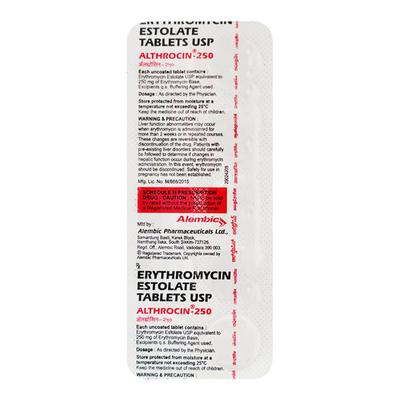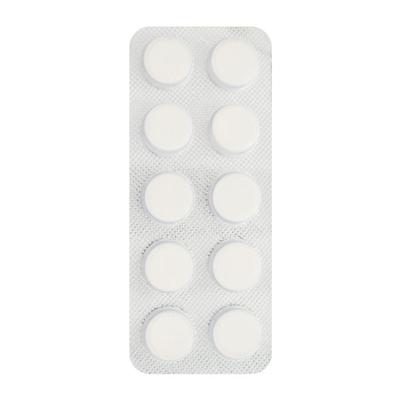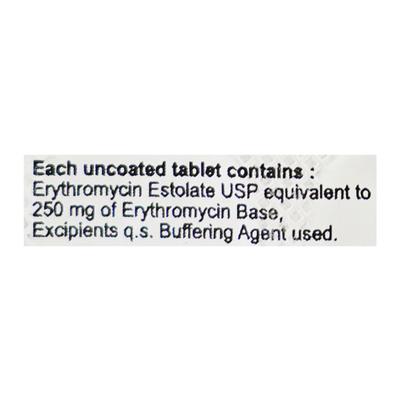

Netmeds First Membership
Quick Links
Introduction About ALTHROCIN 250MG TABLET
ALTHROCIN 250MG TABLET contains Erythromycin, which belongs to the group of medicines called Macrolide antibiotics. It is used in the management of various bacterial infections such as throat and sinus infections, chest infections (such as bronchitis and pneumonia), eye and ear infections, mouth and dental infections, skin and tissue infections (such as acne), and stomach and intestinal infections.
Also, it is used to manage infections following burns, operations, or dental procedures and manages other infections such as sexually transmitted diseases, bone infections, or scarlet fever.
Inform your doctor before taking any blood tests, as ALTHROCIN 250MG TABLET may interfere with the laboratory investigation. Do not stop taking ALTHROCIN 250MG TABLET until your course is over without consulting your doctor.
ALTHROCIN 250MG TABLET is not recommended for use in patients with heart rhythm disorders or with a family history of heart rhythm disorders, an abnormality of the electrocardiogram, or low levels of potassium or magnesium in the blood.
ALTHROCIN 250MG TABLET should be used with caution in patients with liver or heart disease, myasthenia gravis (muscle weakness), who have or ever had diarrhea following the use of antibiotics.
ALTHROCIN 250MG TABLET should be used with caution in pregnant women and with sexually transmitted disease syphilis. It should be used with caution in breast-feeding women. ALTHROCIN 250MG TABLET should be used with caution in children above 8 years of age and in children who feel irritable or vomit after being managed with antibiotics.
The common side effects of taking ALTHROCIN 250MG TABLET are nausea, vomiting, stomach pain, diarrhea, and loss of appetite. Consult your doctor if any of the side effects worsen.
Uses Of ALTHROCIN 250MG TABLET
Manages bacterial infections such as:
- Throat and sinus infections
- Chest infections (such as bronchitis and pneumonia)
- Ear infections
- Mouth and dental infections
- Eye infections
- Skin and tissue infections (such as acne)
- Stomach and intestinal infections
- Infection following burns, operations, or dental procedures
- Other infections (such as sexually transmitted diseases, bone infections, or scarlet fever)
How ALTHROCIN 250MG TABLET Works
ALTHROCIN 250MG TABLET contains erythromycin, a bacteriostatic in action that manages the further growth of bacteria rather than directly killing the bacteria. Erythromycin works by blocking protein synthesis in the bacteria. It does not affect protein synthesis in human tissues. When administered orally, it is easily absorbed from the gastrointestinal system. Thus, ALTHROCIN 250MG TABLET manages bacterial infections.
How to use ALTHROCIN 250MG TABLET
Take ALTHROCIN 250MG TABLET as advised by your physician. Swallow ALTHROCIN 250MG TABLET with a glass of water. Do not crush or chew the medicine. Your doctor will decide the correct dose and duration for you depending upon your age, body weight, and disease condition.
Side Effects Of ALTHROCIN 250MG TABLET
Common
- Nausea, vomiting
- Stomach pain
- Diarrhoea
- Loss of appetite
Rare
- Inflammation of pancreas
Stop taking ALTHROCIN 250MG TABLET and contact your doctor immediately if you experience any of the following side effects:
- Allergic reaction (signs include swelling of the lips, throat, or tongue, difficulty swallowing or breathing, ulcers in the mouth and throat)
- Breathing difficulty, fainting
- Severe diarrhea may contain blood or mucus
- Serious skin rashes involve blistering of the face and limbs (Stevens-Johnson syndrome, toxic epidermal necrolysis, and erythema multiforme)
- Liver or gallbladder problems, yellowing of the skin, eyes (jaundice), pale stools with dark urine
- Seizures
- Abnormal heart rhythms (palpitations, fast heartbeat, irregular heartbeat) or heart stopping (cardiac arrest)
- Red, scaly rash with bumps in skin and blisters (exanthematous pustulosis)
How To Manage Side Effects
Diarrhea
Drink a lot of fluids, such as water or fruit juices, to keep yourself hydrated. Avoid taking any medicine on your own for managing diarrhea. Consult your doctor if the diarrhea does not improve.
Nausea And Vomiting
Try to take ALTHROCIN 250MG TABLET with or just after a meal or a snack. Stick to simple meals. Avoid eating oil-rich, fried, or spicy foods. Consult your doctor if the nausea and vomiting do not improve.
Stomach Pain
Rest and relax. Eat and drink slowly or try to have smaller and more frequent meals. Keep a heat pad on your stomach. Do not self-manage on your own and consult your doctor if the stomach pain does not improve.
Warning & Precautions
Pregnancy
Monitoring requiredALTHROCIN 250MG TABLET should be used during pregnancy only if considered clearly necessary. Consult your doctor before taking ALTHROCIN 250MG TABLET.
Breastfeeding
Use with CautionALTHROCIN 250MG TABLET should be used with caution in breast-feeding women. Consult your doctor before taking ALTHROCIN 250MG TABLET.
Driving and Using Machines
SafeALTHROCIN 250MG TABLET does not influence your abilities to drive or operate any machines.
Alcohol
ContraindicatedConsumption of alcohol is not recommended during management with ALTHROCIN 250MG TABLET.
Liver
Use with CautionALTHROCIN 250MG TABLET should be used with caution in patients with liver problems. Consult your doctor before taking ALTHROCIN 250MG TABLET.
Allergy
ContraindicatedDo not take ALTHROCIN 250MG TABLET if you are allergic to erythromycin, clarithromycin, or azithromycin.
Heart Disease
Consult your doctorALTHROCIN 250MG TABLET is not recommended for use in patients with heart rhythm disorders or with a family history of heart rhythm disorders or an abnormality of the electrocardiogram. It should be used with caution in patients with heart problems. Consult your doctor before taking ALTHROCIN 250MG TABLET.
Use In Pediatrics
Consult your doctorALTHROCIN 250MG TABLET is not recommended for use in children under 8 years of age, and it should be used with caution in children and adolescence above 8 years of age and in children who feel irritable or vomit after being managed with antibiotics. Consult your child’s doctor for advice.
Others
ALTHROCIN 250MG TABLET is not recommended for use if you:
- Have low levels of potassium (hypokalaemia)
- Have low levels of magnesium (hypomagnesaemia)
Before taking ALTHROCIN 250MG TABLET, inform your doctor if you:
- Have myasthenia gravis (muscle weakness)
- Have or ever had diarrhea following the use of antibiotics
Interactions
A. Drug-Drug interactions:
Before taking ALTHROCIN 250MG TABLET, inform your doctor if you are taking any of the following medicines:
- Medicine used to manage migraines (Ex. ergotamine or dihydroergotamine)
- Medicines used to manage allergic reactions (Ex. astemizole, terfenadine, mizolastine)
- Medicine used to manage nausea and vomiting (Ex. domperidone)
- Medicines used to manage GERD (Ex. cisapride, cimetidine, and omeprazole)
- Pimozide, amisulpride (used to manage psychiatric conditions)
- Simvastatin (used to manage high cholesterol)
- Tolterodine (used in the management of overactive bladder)
- Colchicine (used in the management of gout and arthritis)
- Medicines used in the management of bacterial infection (Ex. clarithromycin, rifabutin, or rifampicin)
- Medicines used to manage fungal infections (Ex. fluconazole, ketoconazole, and itraconazole)
- Medicines used to manage heart problems (Ex. digoxin, disopyramide, or quinidine)
- Medicine used to manage peripheral circulation problems (Ex. cilostazol)
- Medicines used to produce sleep (Ex. hexobarbitone, phenobarbitone, zopiclone, midazolam)
- Medicine used to manage blood clots (Ex. warfarin, acenocoumarol, and rivaroxaban)
- Medicines used to manage epilepsy (Ex. valproate, carbamazepine, or phenytoin)
- Medicine used to manage asthma and breathing problems (Ex. theophylline)
- Medicines used to manage organ rejection (Ex. ciclosporin or tacrolimus)
- Bromocriptine (used to manage Parkinson’s disease)
- Triazolam, alprazolam (used to manage anxiety)
- Alfentanil (used to relive pain)
- Methylprednisolone (used to manage inflammation)
- St. John’s wort (used to manage mental illness)
- Medicine used to manage high blood pressure (Ex. verapamil)
- Vinblastine (used to manage cancer)
- Medicine used to manage erectile dysfunction (Ex. sildenafil)
- Medicines used to manage viral infections (Ex. saquinavir)
- Medicines used to manage pregnancy (Ex. ethinyl estradiol)
Overdosage:
If you or anyone else accidentally take too much of ALTHROCIN 250MG TABLET, consult your doctor immediately or visit the nearby hospital. Overdosage symptoms of ALTHROCIN 250MG TABLET include temporary hearing loss, nausea, vomiting, and diarrhea.
Synopsis
| Drug | : | Erythromycin |
| Pharmacological Category | : | Macrolide antibiotics |
| Therapeutic Indication | : | Various bacterial infections |
| Dosage Forms | : | Tablet, Capsule, Oral Suspension, Syrup, Oral drops, Liquid, Injection, Cream, Gel, Ointment |
More Information
Storage
- Keep ALTHROCIN 250MG TABLET out of reach of children
- Store at room temperature
FAQs About ALTHROCIN 250MG TABLET
Q: What is ALTHROCIN 250MG TABLET used for?
A: ALTHROCIN 250MG TABLET is used in the management of various bacterial infections such as throat and sinus infections, chest infections (such as bronchitis and pneumonia), eye and ear infections, mouth and dental infections, skin and tissue infections (such as acne), and stomach and intestinal infections. Also, it is used to manage infections following burns, operations, or dental procedures and manages other infections such as sexually transmitted diseases, bone infections, or scarlet fever.
Q: Is ALTHROCIN 250MG TABLET safe to use in patients with heart problems?
A: ALTHROCIN 250MG TABLET is not recommended for use in patients with heart rhythm disorders or with family history of heart rhythm disorders or an abnormality of the electrocardiogram. It should be used with caution in patients with heart problems. Consult your doctor before taking it.
Q: Can ALTHROCIN 250MG TABLET be used in pregnant and breast-feeding women?
A: ALTHROCIN 250MG TABLET should be used during pregnancy only if clearly advised by the doctor, and it should be used with caution in breast-feeding women. Consult your doctor before taking this medicine if you are pregnant, planning to become pregnant, or breast-feeding your child.
Q: How does ALTHROCIN 250MG TABLET work?
A: ALTHROCIN 250MG TABLET contains erythromycin, a bacteriostatic in action that manages the further growth of bacteria rather than directly killing the bacteria. Erythromycin works by blocking protein synthesis in the bacteria. It does not affect protein synthesis in human tissues. When administered orally, it is easily absorbed from the gastrointestinal system. Thus, ALTHROCIN 250MG TABLET manages bacterial infections.
Q: Does ALTHROCIN 250MG TABLET cause diarrhea?
A: Yes, ALTHROCIN 250MG TABLET may cause diarrhea in some individuals. To manage this effect, drink a lot of fluids, such as water or fruit juices, to keep yourself hydrated. Avoid taking any medicine on your own for managing diarrhea. Consult your doctor if the symptom does not improve.
Q: Can ALTHROCIN 250MG TABLET be used in children?
A: ALTHROCIN 250MG TABLET is not recommended for use in children under 8 years of age, and it should be used with caution in children and adolescence above 8 years of age and in children who feel irritable or vomit after being managed with antibiotics. Consult your child’s doctor for advice.
Q: What are the side effects of taking ALTHROCIN 250MG TABLET?
A: The common side effects of taking ALTHROCIN 250MG TABLET are nausea, vomiting, stomach pain, diarrhea, and loss of appetite. Consult your doctor if any of the side effects worsen.
Q: How does ALTHROCIN 250MG TABLET work?
A: ALTHROCIN 250MG TABLET contains erythromycin, a bacteriostatic in action that manages the further growth of bacteria rather than directly killing the bacteria. Erythromycin works by blocking protein synthesis in the bacteria. It does not affect protein synthesis in human tissues. When administered orally, it is easily absorbed from the gastrointestinal system. Thus, ALTHROCIN 250MG TABLET manages bacterial infections.
Q: Who should not take ALTHROCIN 250MG TABLET?
A: ALTHROCIN 250MG TABLET is not recommended for use in patients with heart rhythm disorders or with family history of heart rhythm disorders or an abnormality of the electrocardiogram, have low levels of potassium (hypokalaemia), low levels of magnesium (hypomagnesaemia), or are allergic to erythromycin, clarithromycin, or azithromycin. Consult your doctor before taking it.
Q: What precautions must be taken while using ALTHROCIN 250MG TABLET?
A: Before taking ALTHROCIN 250MG TABLET, inform your doctor if you have heart problems, liver problems, myasthenia gravis (muscle weakness), or a history of diarrhea following the use of antibiotics.
References
1. K.D. Tripathi. Macrolide, Lincosamide, Glycopeptide, and Other Antibacterial Antibiotics Urinary Antiseptics. Essentials of Medical Pharmacology. Seventh Edition. 2013. Page no – 752.
2. Farzam K, Nessel TA, Quick J. Erythromycin. NIH National Library of Medicine, National Center for Biotechnology Information. June 2022. [Accessed on 29th July 2024] https://www.ncbi.nlm.nih.gov/books/NBK532249/
3. Aesica Queenborough Limited. Electronic Medicines Compendium (EMC). [Revised in June 2022] [Accessed on 29th July 2024] https://www.medicines.org.uk/emc/files/pil.404.pdf
4. Abbott Laboratories, U.S. Food & Drug Administration [Revised in November 2010] [Accessed on 29th July 2024] https://www.accessdata.fda.gov/drugsatfda_docs/label/2011/050611s027lbl.pdf
Useful Diagnostic Tests
- Complete Blood Count (CBC)/ Hemogram
- Peripheral Smear Examination By Pathologist
- Healthy Midlife Checkup
- Men Health Checkup – Advanced
- Complete Women Checkup
- Senior Citizen Checkup - Female
- Senior Citizen Checkup - Male
- Full Body Checkup - Gold
- Full Body Checkup – Silver









